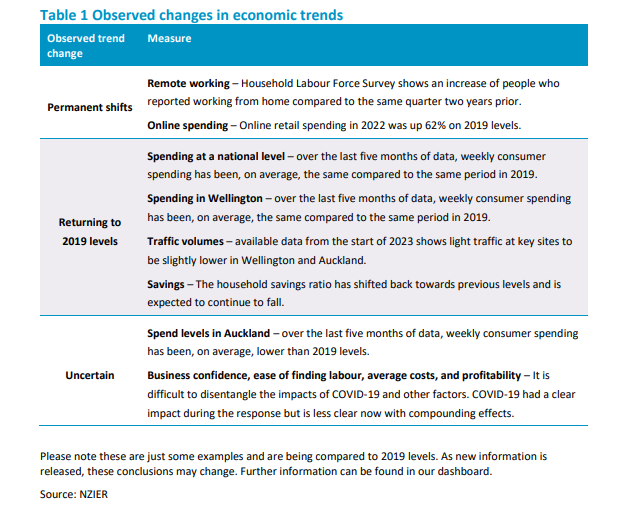New Zealand Institute of Economic Research (Inc)
Media Release, 6 April 2023
For immediate release
COVID-19 has had lasting effects on our behaviour and has acted as an accelerant, changing our economic lives forever.
A newly released NZIER working paper examines changing consumer and business trends that occurred from COVID-19.
NZIER Senior Economist Daniel Hamill says, “It’s been over a year since the COVID-19 alert system ended and lockdowns with it. Enough time has passed since the last set of lockdowns that we can say remote working and online shopping are here to stay.”
We know working from home in some capacity has increased alongside online consumer spending by over 50 percent in 2022 compared to 2019.”
“Spending took a big hit due to regional lockdowns, and (as of the end of last year) Auckland is still yet to fully recover, showing lower spending levels than in 2019. This has large flow-on impacts on small-to-medium businesses who can’t afford to continue operating with lower demand, higher costs, and the inability to overcome labour shortages.”
We have categorised the impacts as permanent shifts, returning to 2019, or uncertain, as seen in the table. The biggest, permanent shift seems to be the increase in remote working and the flow-on effects that may have on business. The most significant short-term impact seen was the decreased spending around the country from lockdowns and uncertainty. The largest uncertainty effect we currently have is when spending levels in Auckland will return to pre-COVID-19 levels.
“It is clear why we have seen the lowest business confidence in the last quarter since 1974 as companies grapple with higher interest rates, cost pressures and soft demand, coming off the back of a global pandemic and then being hit by the impacts from the war in Ukraine. Out of the frying pan and into the freezer”, says Daniel.
“The impacts of COVID-19 across society will be focused on for years to come, and we will continue to focus on economic impacts and behaviour changes as more information comes to light to help prepare for the current environment and the future”.
Alongside our working paper, we have produced a Shiny dashboard, available via NZIER’s website. This dashboard provides interactive datasets at the national and regional levels to analyse the economic impact of COVID-19.

For further information, please contact:
Daniel Hamill
Senior Economist
Daniel.hamill@nzier.org.nz